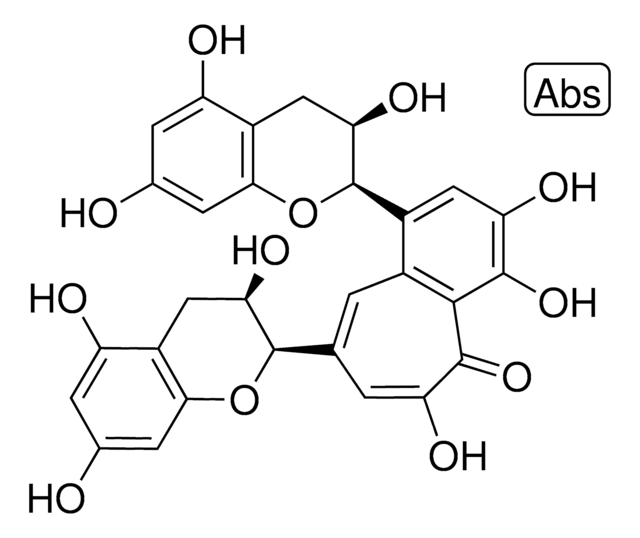01388
(−)-Gallocatechin
analytical standard
Synonym(s):
(2S,3R)-2-(3,4,5-Trihydroxyphenyl)-3,4-dihydro-1(2H)-benzopyran-3,5,7-triol
About This Item
Recommended Products
grade
analytical standard
Assay
≥97.0% (HPLC)
shelf life
limited shelf life, expiry date on the label
technique(s)
HPLC: suitable
gas chromatography (GC): suitable
application(s)
food and beverages
format
neat
storage temp.
2-8°C
SMILES string
O[C@@H]1Cc2c(O)cc(O)cc2O[C@H]1c3cc(O)c(O)c(O)c3
InChI
1S/C15H14O7/c16-7-3-9(17)8-5-12(20)15(22-13(8)4-7)6-1-10(18)14(21)11(19)2-6/h1-4,12,15-21H,5H2/t12-,15+/m1/s1
InChI key
XMOCLSLCDHWDHP-DOMZBBRYSA-N
Looking for similar products? Visit Product Comparison Guide
General description
Application
Packaging
Signal Word
Warning
Hazard Statements
Precautionary Statements
Hazard Classifications
Eye Irrit. 2 - Skin Irrit. 2 - STOT SE 3
Target Organs
Respiratory system
Storage Class Code
11 - Combustible Solids
WGK
WGK 3
Flash Point(F)
Not applicable
Flash Point(C)
Not applicable
Choose from one of the most recent versions:
Already Own This Product?
Find documentation for the products that you have recently purchased in the Document Library.
Customers Also Viewed
Articles
Validated HPLC method (based on Ph. Eur. Monograph 2668) for quantifying catechins and caffeine in decaffeinated green tea using a Chromolith® High Resolution RP-18e column with advantages in terms of backpressure and matrix robustness.
Validated HPLC method (based on Ph. Eur. Monograph 2668) for quantifying catechins and caffeine in decaffeinated green tea using a Chromolith® High Resolution RP-18e column with advantages in terms of backpressure and matrix robustness.
Validated HPLC method (based on Ph. Eur. Monograph 2668) for quantifying catechins and caffeine in decaffeinated green tea using a Chromolith® High Resolution RP-18e column with advantages in terms of backpressure and matrix robustness.
Validated HPLC method (based on Ph. Eur. Monograph 2668) for quantifying catechins and caffeine in decaffeinated green tea using a Chromolith® High Resolution RP-18e column with advantages in terms of backpressure and matrix robustness.
Our team of scientists has experience in all areas of research including Life Science, Material Science, Chemical Synthesis, Chromatography, Analytical and many others.
Contact Technical Service











